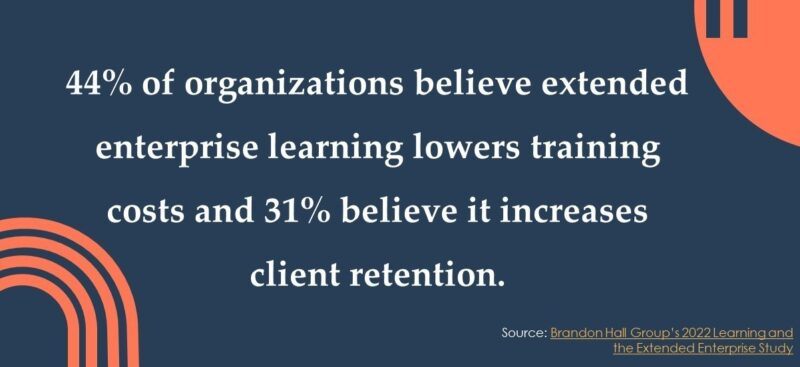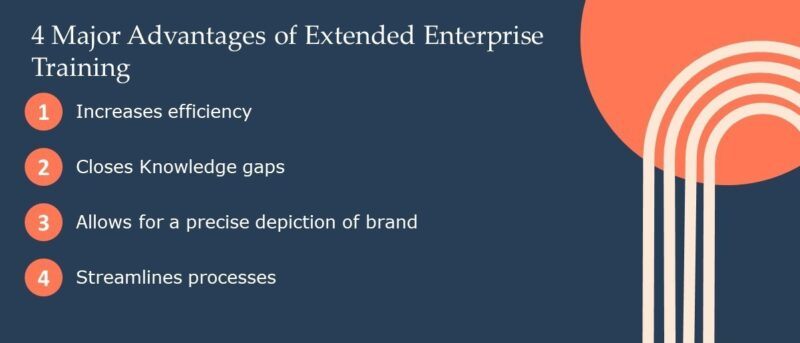Why Do You Need Extended Enterprise Training?
Delivering effective extended enterprise training to a wide range of partners, customers, and external audiences can be complex and challenging. It requires striking a balance between tailoring the training to meet the unique needs and characteristics of each organization while maintaining a consistent level of quality. To streamline this, a robust training ecosystem is essential. It not only simplifies the management and delivery of training but ensures that every member of the extended enterprise benefits from a high-quality and relevant learning experience, ultimately leading to success for all parties involved.
Let's look at some winning ways to carry out smooth extended enterprise training in this article.

Understanding The Stakeholders
Understanding the unique learning needs of your extended enterprise's employees, partners, and other stakeholders is critical for effective training ecosystem development. Conducting surveys and interviews is an important way to understand their training needs and goals. These should be carefully designed to collect quantitative data, providing statistical insights into participants' preferences, knowledge levels, and perceived training gaps, as well as providing opportunities for qualitative exploration and delving further into individual experiences, challenges, and even expectations.
This should not be viewed as a one-time thing but rather as an ongoing, iterative process. Regularly revisiting surveys and interviews enables you to adapt your training content and delivery methods to evolving needs, ensuring that the training ecosystem remains relevant and effective. Moreover, showcasing the commitment to meeting stakeholders' needs fosters a culture of continuous learning and engagement within the extended enterprise.
Integrating External Apps
In addition to investing in an effective Learning Management System (LMS) to centralize training content and administration, ensure the chosen one supports the integration of third-party apps and payment sites.
Platforms like Shopify can seamlessly introduce eCommerce functionalities into your training ecosystem. This is particularly valuable where partners need to purchase material related to the training. This not only streamlines the process but also helps learners seamlessly handle transactions, too.
Payment integration apps like PayPal are an excellent solution for secure and efficient payment processing within the training platform. They offer flexibility for learners who need to make payments for courses, certifications, or any other training-related purchases. This ease of payment fosters a seamless experience, reducing any friction in the training journey.
Integrating external apps into extended enterprise learning amplifies the training, as these integrations provide diverse benefits to both organizations and learners.
Offering Personalization
By harnessing the power of data-driven insights, organizations can tailor learning experiences to meet the unique needs and preferences of each learner, whether they are partners, customers, or external stakeholders. This personalization goes beyond mere content recommendation and encompasses the entire learning journey.
Learners can advance at their own pace and concentrate on topics that are most helpful to their roles or learning objectives with personalized learning. For instance, a partner focusing on sales may receive different course recommendations than a learner interested in technical training. This level of personalization results in a more efficient learning experience and higher engagement.
Learners can connect with peers, mentors, or Subject Matter Experts based on their needs and interests. These connections facilitate knowledge sharing, problem solving, and networking opportunities. This personalized social aspect of learning creates a sense of belonging and shared goals within the extended enterprise network.

Scalability
Scalability is a fundamental consideration in the design of extended enterprise training, and it's essential for accommodating the diverse and ever-expanding needs of partners, customers, and external stakeholders. Designing the ecosystem to accommodate growth and changes within your extended enterprise is essential to ensure it handles an increasing number of users and evolving training needs.
Whether onboarding new partners, servicing additional customers, or engaging with more external audiences, a scalable LMS ensures that the training infrastructure can adapt without disruption. Scalable content allows organizations to keep pace with the evolving demands of their extended enterprise, ensuring that training remains relevant and valuable for all stakeholders.
Scalability in extended enterprise learning ensures that organizations can efficiently grow their networks while providing relevant and adaptable training experiences.
Compliance And Security
Compliance and security should be handled carefully in extended enterprise training where partners, customers, and external stakeholders engage with an organization's training content. Ensuring that these training programs adhere to industry regulations, privacy standards, and security protocols is essential for building trust and mitigating risk.
As compliance requirements vary across different organizations and industries, the ecosystems should offer the flexibility to tailor training content to align with specific compliance mandates. This entails tracking and reporting capabilities that can provide detailed records of who has completed what training, and security measures, such as encrypted data transmission and secure authentication processes to protect sensitive information.
Compliance and security are non-negotiable aspects of extended enterprise learning, so organizations must adapt their training programs to meet compliance standards while simultaneously fortifying the ecosystem's security to protect sensitive data. This not only ensures adherence to regulations but also fosters trust and credibility within the extended enterprise network.
Wrapping Up
In the landscape of extended enterprise learning, a robust ecosystem is the foundation for success. It not only enables seamless training delivery to partners, customers, and external stakeholders but also upholds the quality, personalization, scalability, and compliance necessary to meet diverse needs and ensure regulatory adherence. Truly, the power of a strong extended learning ecosystem lies in its ability to foster engagement, facilitate knowledge sharing, and strengthen relationships across an expansive network.
Keep in mind that creating and maintaining a strong training ecosystem is an ongoing process. Review and update your training content and technology regularly to keep up with changing needs and emerging trends in extended enterprise training and embark on your journey towards success!


